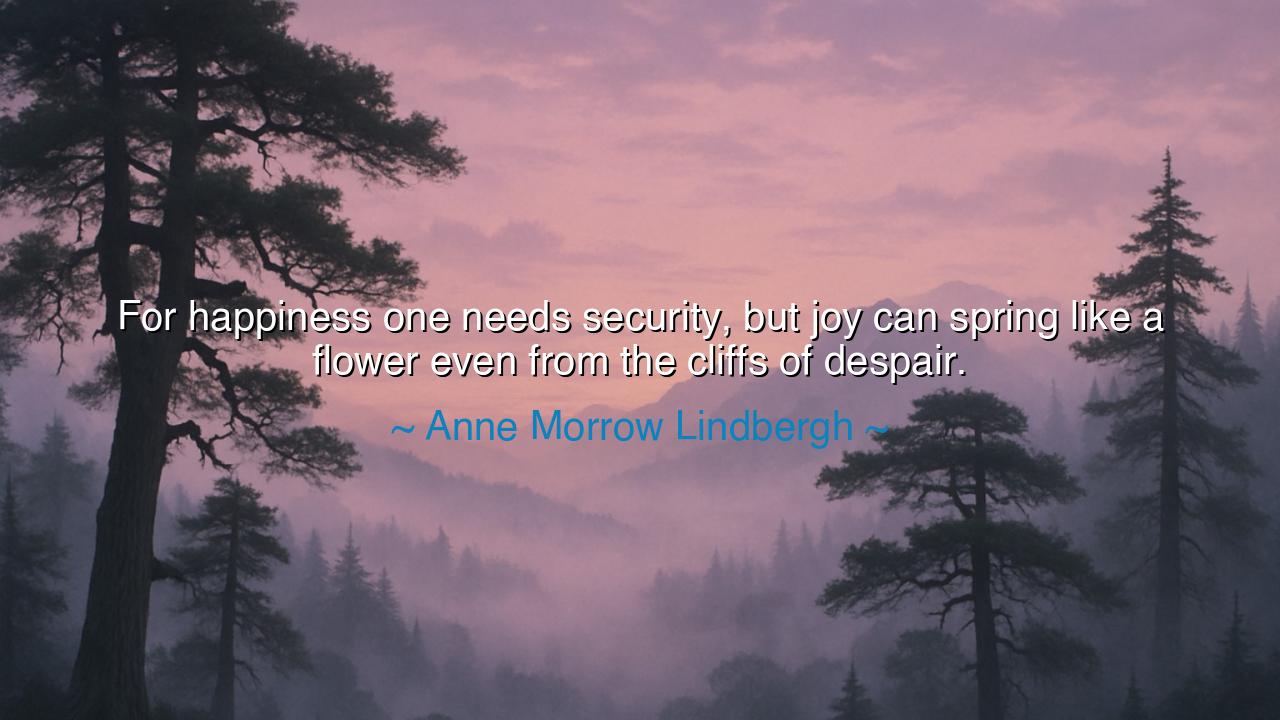
For happiness one needs security, but joy can spring like a
For happiness one needs security, but joy can spring like a flower even from the cliffs of despair.






"For happiness one needs security, but joy can spring like a flower even from the cliffs of despair." These words, spoken by Anne Morrow Lindbergh, carry the fragrance of wisdom gathered through both beauty and suffering. She knew well the tremors of life—the heights of love, the depths of loss—and from those contrasts she distilled this truth: that happiness and joy, though they seem sisters, are born of different soil. Happiness requires shelter, stability, and peace. But joy—ah, joy!—is a wild thing. It blooms not in comfort, but in courage; not in safety, but in the heart that refuses to die even when the world grows dark.
Anne Morrow Lindbergh, wife of the famed aviator Charles Lindbergh, lived through triumphs that dazzled the world and tragedies that broke the heart. When her infant son was stolen and lost to violence, her soul was cast upon the cliffs of despair. Yet from that desolation arose a strength and gentleness that later shaped her writings. She came to understand that happiness is the fruit of earthly peace, but joy is the miracle of the spirit—it springs from within, like a flower breaking through stone. Happiness depends on what the world gives us; joy depends on what we give to the world, even when all else is taken.
The ancients too made this distinction, though in other words. The Stoics spoke of ataraxia—tranquility of the mind—as the ground of happiness, built upon order, safety, and self-control. But joy—they said—was something deeper, rarer, like the fire of Prometheus that burns in the human soul. It arises when the heart, though broken, still affirms life. Joy is divine rebellion—the refusal of the spirit to bow to despair. It is the song of the bird that sings though the night has no dawn.
Think of Nelson Mandela, who spent twenty-seven years in the darkness of prison. The world had taken his freedom, his comforts, his security. By all measures, happiness was impossible. Yet even there, joy bloomed within him. He forgave his captors. He laughed with his guards. He emerged not bitter, but radiant. His spirit was unbroken, and his joy—born from pain—became a light for millions. His life was proof that even in the harshest stone, life can find a crack, and from that crack, a flower can grow.
The cliffs of despair are the testing ground of the human soul. Those who cling only to happiness will falter when the winds of loss come, for happiness depends on things that pass away. But joy is eternal, for it is rooted not in circumstance, but in the courage to feel, to love, and to hope against hope. The flower that grows upon the cliff does not ask for fertile ground—it draws its life from the mere possibility of the sun. So too, the human heart can draw light from even the smallest glimmer of meaning.
The lesson, then, is this: seek happiness, but do not mistake it for joy. Build your home in peace when you can—cherish safety, friendship, and rest. These are the gifts that make life sweet. But when storms come, and the world takes from you the roof and the calm, remember that joy is still yours to claim. It may come as a quiet tear, as a sudden laugh through sorrow, or as the strength to stand once more when your knees would rather fail.
So, my children of tomorrow, do not fear the cliffs of despair. Stand upon them. Let the wind strike your face and the void whisper beneath your feet, for it is there that joy reveals itself—raw, defiant, alive. Happiness will comfort you in good times, but joy will save you in the dark. And when the flower blooms from the rock, know that you have touched the immortal heart of life itself—the secret that no despair can destroy: that the human spirit, though fragile, is unyieldingly free.






AAdministratorAdministrator
Welcome, honored guests. Please leave a comment, we will respond soon